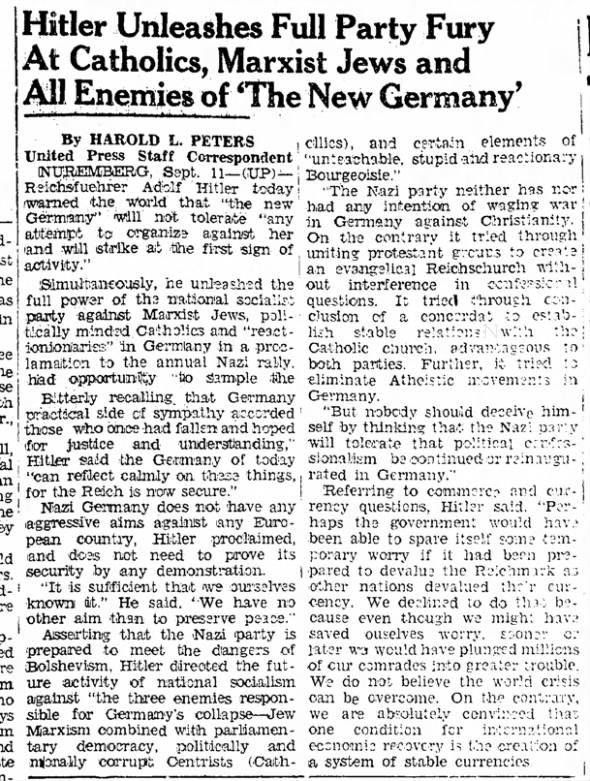- Headline
-
Hitler Unleashes Full Party Fury at Catholics, Marxist Jews and All Enemies of 'The New Germany'
- Publication Date
- Tuesday, September 3, 1935
- Historical Event
-
Hitler Announces Nuremberg Race Laws
This database includes 982 articles about this event - Article Type
- Newspaper
- Page Section and Number
- 3
- Author/Byline
- Harold L. Peters (UP)
- Article Text
- NUREMBERG, Sept. 11—(UP)—Reichsfuehrer Adolf Hitler today warned the world that "the new Germany" will not tolerate "any attempt to organize against her and will strike at the first sign of activity."
Simultaneously, he unleashed the full power of the national socialist party against Marxist Jews, politically minded Catholics, and "reactionaries" in Germany in a proclamation to the annual Nazi rally had the opportunity "to sample the Bitterly recalling that Germany practical side of sympathy accorded those who once had fallen and hoped for justice and understanding," Hitler said the Germany of today "can reflect calmly on these things, for the Reich is not secure."
Nazi Germany does not have any aggressive aims against any European country, Hitler proclaimed, and does not need to prove its security by any demonstration.
"It is sufficient that we ourselves known it." He said. "We have no other aim than to preserve peace."
Asserting that the Nazi party is prepared to meet the dangers of Bolshevism, Hitler directed the future activity of national socialism against "the three enemies responsible for Germany's collapse—Jew Marxism combined with parliamentary democracy, politically and morally corrupt Centrists (Catholics), and certain elements of "unteachable, stupid and reactionary Bourgeoisie."
"The Nazi party neither has nor had any intention of waging war in Germany against Christianity. On the contrary it tried through uniting protestant groups to create an evangelical Reichschurch with out interference in confessional questions. It tried through conclusion of a concordat to establish stable relations with the Catholic church, advantageous to both parties. Further, it tried to eliminate Atheistic movements in Germany.
"But nobody should deceive himself by thinking that the Nazi party will tolerate that political confessionalism be continued or reinvigorated in Germany."
Referring to commerce and currency questions, Hitler said "Perhaps the government would have been able to spare itself some temporary worry if it had been prepared to devalue the Reichmark as other nations devalued their currency. We declined to do that because even though we might have saved ourselves worry, sooner or later we would have plunged millions of our comrades into greater trouble. We do not believe the world crisis can be overcome. On the contrary, we are absolutely convinced that one condition for international economic recovery is the creation of a system of stable currencies." - History Unfolded Contributor
- Karen B.
- Location of Research
- Newspapers.com (https://www.newspapers.com)
Learn More about this Historical Event: Hitler Announces Nuremberg Race Laws
- Nuremberg Race Laws: Background (Encyclopedia Article)
- Nuremberg Race Laws: Translation (Encyclopedia Article)
- The Nuremberg Race Laws (The Holocaust: A Learning Site for Students)
- Anti-Jewish Legislation in Pre-War Germany (Encyclopedia Article)
- Racism (Encyclopedia Article)
Bibliography
Burleigh, Michael, and Wolfgang Wippermann. The Racial State: Germany 1933–1945. Cambridge: Cambridge University Press, 1991.
Edelheit, Abraham J., and Hershel Edelheit. "Legislation, Anti-Jewish." In History of the Holocaust: A Handbook and Dictionary, pp. 299–331. Boulder, CO: Westview Press, 1994.
Friedländer, Saul. Nazi Germany and the Jews. New York: HarperCollins, 1997.
Mosse, George L. Toward the Final Solution: A History of European Racism. Madison: University of Wisconsin Press, 1985.
Schleunes, Karl A. The Twisted Road to Auschwitz: Nazi Policy Toward German Jews, 1933–1939. Urbana: University of Illinois Press, 1970.
Wistrich, Robert S. Antisemitism: The Longest Hatred. London: Thames Methuen, 1991.
All articles about this event
Download the full newspaper page
See full image on newspapers.com
Newspaper images provided by Newspapers.com
